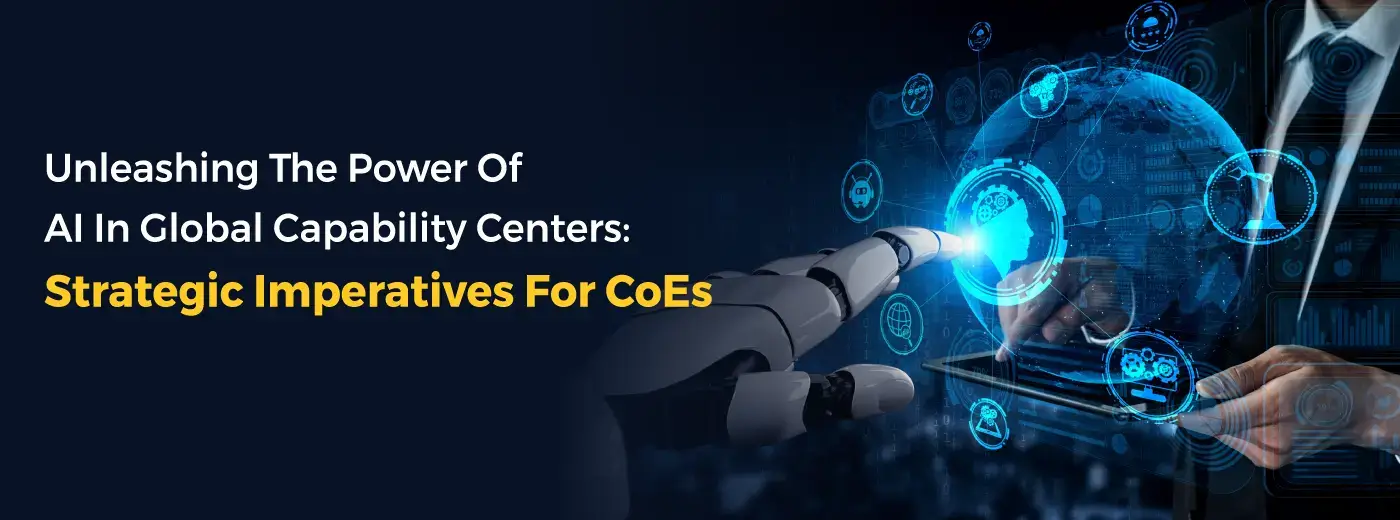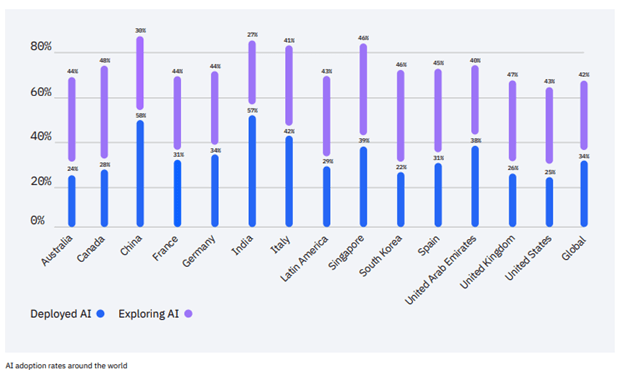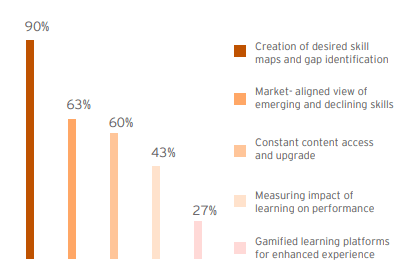
Sign up to receive latest insights & updates in technology, AI & data analytics, data science, & innovations from Polestar Analytics.
Editor's Note: As multinational corporations continue to move to an AI-first paradigm. This article provides valuable insights into the strategic imperatives that Global Capability Centers (GCCs) need to consider when implementing Artificial Intelligence (AI) in their operations. It also discusses the importance of taking an incremental approach and highlights key areas that GCCs should focus on to maximize the benefits of AI.
The much-talked-about "next normal" is already here and much sooner than we had all anticipated. Global Capability Centers (GCCs) are at a critical inflection point. As multinational corporations continue to move to an AI-first paradigm, they look at their GCCs to provide AI prowess to drive this transformation.
93% of IT executives in the U.S. say their enterprise is leveraging some form of centre of Excellence (COE) to drive AI and data science initiatives. IDC
Recently, the GCC story has been in a changing era of value and transformative arbitrage. Most GCCs aims to deploy a suite of AI-led strategies to position themselves as the model template of the AI centre of Excellence.
The term' Centre of Excellence has become very popular in the last few years among organizations of all stripes. CoEs are now set up to attract talent and develop proof of concepts (PoC) around emerging technologies. The main objective of a CoE is to help an organization improve its expertise in a particular area and make the most of its resources.
Recently, it has been observed that the development of several incubators and accelerators by major tech giants that are tapping into the thriving Indian ecosystem to develop expertise in emerging technologies. India is already the hub for CoE, especially in areas like analytics and business intelligence.

An AI Centre of Excellence (AI CoE) is a centralized group of knowledge teams that guides and oversees the implementation of organization-wide AI projects. An AI CoE combines the AI talent, resources, and knowledge required to allow AI-based transformation projects. It brings together all the AI capabilities required to address the complexities of AI adoption and prioritize AI investments.
AI COE serves as an internal centralized counsel to identify new opportunities for leveraging AI to solve numerous business tribulations, such as controlling costs, improving efficiency, and optimizing revenue. The key aim of setting up an AI CoE is to support and build the AI vision of the organization and serve as an internal counsel to manage all AI projects.
AI is widely predicted to disrupt and transform capability centres in the coming decades. How are Global Capability Centres in India looking at positioning themselves as a model template for developing AI centres of competence? How have the strategies of GCCs transformed concerning parent organizations?
Get in touch to revolutionizing the future of business with AI. Our consultative approach offers the resources, expertise, and technology you need to drive growth and success in the digital age.
Technology is constantly transforming. Organizations must continuously adapt their AI roadmap to deliver the optimum business value. With scattered data science resources, teams, and legacy systems, it becomes cumbersome to know where to begin with. To set up an AI innovation centre, leaders must take a holistic approach taking in mind all the factors contributing to its success.
| The key pillars of an AI Centre of Excellence
A CoE or innovation centre is built on the following 4 primary pillars: |
| Strategy: Strategy helps clearly define the business goals, identify the high-impact use cases, and prioritize the AI investments. When starting with Artificial Intelligence, it is wise to start with small, achievable, smart, and realistic AI goals. This will allow you to progress rapidly and gauge the ROI from the AI initiatives. |
| People: The people-oriented pillar refers to the data-driven strategies and culture for managing the teams that utilize AI and data within the organization. The people strategy also helps hire the right AI talent and fosters a collaborative, innovation-driven culture. |
| Processes: The process-oriented pillar assists in defining the ways to sustain continual AI innovation within the company. The more iterative and agile the process, the easier it is to learn quickly and adapt to fast-changing business needs. |
| Technology: The right tech stack is significant for building robust AI capabilities. The technology strategy should clearly define the process for evaluating and adopting the latest tools that match the organizational requirements and work well with the existing IT infra. |
1. Evolved AI Centre of Competence
GCCs are increasingly shifting to competency, capability creation models to reduce time-to-market. In this model, the teams are aligned to capability lines of businesses where the AI centre of competence is responsible for creating AI capabilities, roadmaps, and new value offerings, in collaboration with the parent organization's business teams.
This alignment and specific roles have clear visibility of the business user requirement. Further, capability creation and alignment with the parent organization help in tangible value outcomes. In numerous cases, AI teams are building a new range of innovation around AI-based capabilities and solutions to showcase the ensuing GCC as a model template for innovation & transformation.
GCCs must conceptualize a bespoke strategy for building and sustaining the AI Centre of Competence. They must keep it up on the value chain with mature and measured transformation & innovation-led matrices.
2. Develop a robust AI infrastructure
GCCs are investing in developing a robust AI infrastructure to support the development and deployment of AI solutions at scale. This includes investing in cloud computing resources, AI platforms and tools, and data management systems that can handle large volumes of data and support real-time decision-making. GCCs should also develop best practices and standards for AI development and deployment, such as data governance, model training, testing and validation, and security and compliance.
3. Focus on measurable business outcomes
GCCs should focus on delivering measurable business outcomes by aligning AI initiatives with the organization's business goals and KPIs. This includes defining clear success metrics for each AI project, such as the impact on revenue growth, cost savings, customer satisfaction, or employee productivity. GCCs should also track and report on the progress and impact of AI initiatives and use this feedback to continuously improve and optimize their AI strategy and roadmap.
4. Build a strong AI talent pool
The lines between different skills are blurring with the evolution of analytics, data sciences, and AI. GCCs are witnessing a convergence of skills required across domains. The strategic shift of GCCs towards an AI centre of capability model has led to the creation of AI, data engineering & design roles. To build skills in AI & data engineering, GCCs are adopting a hybrid approach. The skill development roadmap for AI is a combination of build and buy strategies.

The decision to acquire talent from the ecosystem or internally build capabilities is a function of three parameters – Maturity of GCC s existing AI capabilities in the desired or adjacent areas, the Tactical nature of skill requirement & Availability and accessibility of talent in the ecosystem.
There’s always a heavy Inclination towards building skills in-house within GCCs. Most GCCs have stressed that the bulk of the future deployment in AI areas will be through in-house skill-building and reskilling initiatives. However, a talent mapping strategy for building AI capability is a measured approach. Else can result in being an Achilles heel for GCC and HR leaders.
5. Develop strong partnerships with external stakeholders
GCCs should develop strong partnerships with external stakeholders such as startups, academia, and industry consortia to keep abreast of the latest AI technologies and best practices and to foster a culture of knowledge sharing and collaboration. GCCs should also participate in industry events and conferences, join relevant AI communities and forums, and contribute to open-source AI projects to establish thought leadership and build their brand in the AI ecosystem.
6. Ensure compliance and ethics in AI
GCCs should ensure that AI initiatives are developed and deployed responsibly and ethically and comply with relevant regulations and standards. This includes ensuring that AI systems are transparent, explainable, and bias-free and that data privacy and security are always maintained. GCCs should also establish a governance framework for AI that includes ethical principles, risk management processes, and accountability mechanisms and provide regular training and awareness programs for employees on AI ethics and compliance.
By adopting these strategic imperatives, GCCs can move up the value chain and become premier AI centres of excellence. This will enable them to deliver more excellent value to the organization and stay ahead of the competition in the rapidly evolving AI landscape.
Transform your business with cutting-edge AI solutions. Let us help you harness the power of artificial intelligence to drive innovation and transform your business.
GCCs in India is uniquely positioned to drive the next wave of growth by building high-impact AI center of competence; there is a slew of innovative & transformative models that they are working on to up the ante and trigger new customer experience, products & services and unleash business transformation for the parent organizations. This will set the existing GCCs on the path to cutting-edge innovation and pave the way for other global organizations contemplating global center setup in India. AI is becoming the front-runner to drive innovation & transformation for GCCs.
Looking ahead, we expect AI CoEs for GCCs to continue to grow in importance as AI becomes more pervasive in business operations. GCCs must invest in building and nurturing AI talent and capabilities to stay competitive in the global marketplace. Additionally, we expect AI CoEs to increasingly focus on ethical and responsible AI practices, given the growing scrutiny around the use of AI and its potential impact on society.
About Author

Content Architect
The goal is to turn data into information, and information into insights.